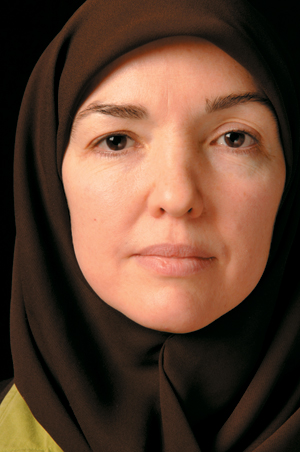|
||
      |
Features ::
Glimpses
 Ingrid Mattson, PhD’99, has been elected the first female president
of the Islamic Society of North America, which bills itself as “the
largest religious organization representing Muslims in North America.” Professor
of Islamic studies and director of Islamic chaplaincy at the Macdonald
Center for Islamic Studies and Christian-Muslim Relations at Connecticut’s
Hartford Seminary, Mattson grew up attending Catholic schools in southern
Ontario but “left religion behind” during high school. Studying
philosophy and fine arts at the University of Waterloo, she spent a summer
in Paris, where she met some West African Muslims. “Through curiosity
about their background, I started learning about Islam,” converting
by her senior year. After reading Islam by
Fazlur Rahman, Chicago’s Harold K. Swift distinguished service professor
in the Department of Near Eastern Languages and Civilizations, she wrote
and asked to study with him. Yet a year before Mattson’s 1989 enrollment,
Rahman died. Instead she studied with Near Eastern history professor Fred
Donner and Islamic-studies professor Wadad
Kadi. Mattson’s book The
Story of the Qur’an: Its History and Place in Muslim Life (Blackwell
Publishing) comes out this spring.
Ingrid Mattson, PhD’99, has been elected the first female president
of the Islamic Society of North America, which bills itself as “the
largest religious organization representing Muslims in North America.” Professor
of Islamic studies and director of Islamic chaplaincy at the Macdonald
Center for Islamic Studies and Christian-Muslim Relations at Connecticut’s
Hartford Seminary, Mattson grew up attending Catholic schools in southern
Ontario but “left religion behind” during high school. Studying
philosophy and fine arts at the University of Waterloo, she spent a summer
in Paris, where she met some West African Muslims. “Through curiosity
about their background, I started learning about Islam,” converting
by her senior year. After reading Islam by
Fazlur Rahman, Chicago’s Harold K. Swift distinguished service professor
in the Department of Near Eastern Languages and Civilizations, she wrote
and asked to study with him. Yet a year before Mattson’s 1989 enrollment,
Rahman died. Instead she studied with Near Eastern history professor Fred
Donner and Islamic-studies professor Wadad
Kadi. Mattson’s book The
Story of the Qur’an: Its History and Place in Muslim Life (Blackwell
Publishing) comes out this spring.
Aftermath of 9/11: I’m very proud of the Muslim American community and its response. We were suddenly burdened with collective guilt in an unfair way—not only on a cultural level, but legislation in effect required central registration of men from predominantly Muslim countries. The community responded maturely, through human-rights groups and an organized legal effort. Ordinary Muslims suddenly had a sense of urgency to stand up and say what being Muslim was to them—not the radical ideology the terrorists said it was. Everyday moms took public-speaking courses and talked about what being Muslim meant to them. Muslims who before were passive or didn’t feel qualified got more involved in civic society and felt empowered to speak about their religion: “If those crazy terrorists can talk about Islam then I’m going to also.”
On Danish cartoons: In America there was no violent demonstration but lots of op-eds. So that raised a question: did European Muslims have access to those kinds of forums? If not, what does that say about European claims of integration? That may be one reason Muslims might react in a more extraordinary way. ... We tried to help [Danish leaders] understand the dynamics of their community. The Muslim American community is diverse, coming from pretty much every Muslim country in the world. In European countries Muslims tend to come from the same place, so Europeans could help Muslim communities get to know Muslims from other countries. The United States is also very comfortable with public expression of religion, which makes Muslims here feel they can talk openly about their faith in a way European Muslims don’t.
Western fallacies: One misconception is that all Muslims are scriptural fundamentalists or Qur’anic literalists. There is a rich scholarly tradition in Islam that demonstrates many different approaches, legal reasoning, scriptural interpretations. You can’t blame people because the fundamentalists project this cartoonish depiction. ... Part of the problem is the tendency to label everything Muslims do as Islamic. News items say, “This Muslim group did this particular action.” The impression is that they’re doing these things because of Islam. Yet when you look at Afghanistan, which is 99 percent Muslim, how can you say the Muslim terrorists attacked the police? The police are also Muslim. If you asked them why they stand up for justice they would ground that in their religious beliefs. We ascribe all the bad motivations to Islam but none of the good.
Feminine mystique: So many women have told me they feel hopeful because of my election. Many Muslim women are frustrated with the marginalization they feel in their local communities. There’s no hierarchical structure in American Muslim life, so our organization can’t impose reforms on any community, but we can offer guidelines. How do we get communities to open up, to give women their rightful place as full members of the community? I find community leadership is heavily male. I can ask, “Don’t you have any women on your board? What is your governance process?” It’s my responsibility to make sure I’m not just a flash in the pan.